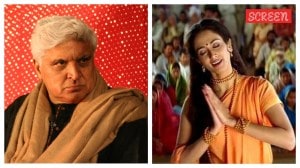CELLebs
Bharat Shah Bharat Shah Charged with abetting gangsters in BollywoodWhen I first arrived in Tihar, Charlie Sobhraj came to meet me and sa...

Bharat Shah
|
Bharat Shah
Charged with abetting gangsters in Bollywood |
|
We were hurt when people turned their backs on us, today we do not let it affect us
|
India8217;s richest diamond merchant and producer of lavish, successful films, Bharat Shah lived life like the opulent Bollywood fantasies he produced. But the Mumbai police soon threw water on his exuberance when they arrested him in January last year, for allegedly aiding and abetting gangsters in financing films and for threatening film personalities for extortion purposes. After several attempts at bail, Shah8217;s application was finally accepted last fortnight.
In the period that Bharat Shah was remanded to police custody, life had changed considerably for his 26-year-old son Rashesh, successor and heir to the vast Shah empire. From living a relaxed life, looking after the family8217;s diamond business and its other well-known enterprise, the popular nightclub, Fire 038; Ice, in Central Mumbai, Rashesh found himself tied down to all the financial commitments his father had undertaken. So, even though Shah remained in custody for the most part of 2001, five prominent films 8212; Kasoor, Chori Chori Chupke Chupke, Mujhe Meri Biwi Se Bachao, Lajja and Yeh Zindagi Ka Safar 8212; were released at cinemas across the country.
Initially disappointed that nobody from the film industry apart from Mahesh Bhatt came forward to lend support to him, Rashesh reflects his father8217;s bitterness when he says, 8216;8216;The past year has opened our eyes to the real world. Earlier we were hurt when people turned their backs on us, but today we try not to let it affect us. We can understand their predicament, because many are worried they will expose themselves to inquiries if they stand up for us,8217;8217; he says.
Passive support, however, came from all quarters. Visitors at their home and at the hospital, where Bharat Shah was mostly confined during his jail term, have included Rekha, Shah Rukh Khan, Anil Kapoor, Dimple Kapadia, Subhash Ghai, Lata Mangeshkar, Mahesh Bhatt, Nina Pillai and Pritish Nandy among others.
As Shah lies recuperating in hospital even after his release for cardiac complications, the hearings for his case are scheduled in the coming weeks. It remains to be seen whether the battle-weary Shah will decide he wants to visit Bollywood again.
KETAN PAREKH
From Dalal Street to White House, the Mumbai headquarters of the CBI. Ketan Parekh, the man who made stock markets move to his tune during the boom days of 1999 and 2000, spent 52 days in jail last year. For millions of investors, the Ketan Parekh saga appeared to be an action replay of the Harshad Mehta scam of 1992. The methods used by the two may be different, but the impact on the stock market and investors was the same. Parekh was arrested by the CBI on March 30, 2001, following a criminal complaint filed by the Bank of India.
Parekh was initially kept in police custody at the White House but was later shifted to a cell in Thane Jail, infamously called anda because of its peculiar egg shape. The country8217;s oldest jail, which has housed prisoners like Lokmanya Tilak and Veer Savarkar, is a high-security prison specifically for solitary confinement. Prisoners here are not even allowed home-cooked food. He spent the rest of his confinement in Thane until he secured bail. During his term, Parekh is reported to have kept to himself; among his few requests were Western pulp fiction and Tinkle cartoon digests. Sources say he never showed any kind of regret for his actions. Parekh8217;s wife sought the help of a local Congress politician to send her imprisoned husband a clean bedsheet. 8216;8216;Parekh was surprisingly compromising and adaptable throughout his stay. He never showed any signs of cracking up,8217;8217; say jail sources.
Parekh8217;s 90 by 100 feet cell, which he shared with others, included an attached, but open, toilet. He is said to have lived mostly on fruit sold in the prison shop. Parekh8217;s Lancer was seen parked outside the jail on several occasions, perhaps waiting for its owner.
Top rung brokers, businessmen and bureaucrats, who would pay court to him when he was the king of the market, predictably deserted him thereby leaving him with only family visitors. Today, after his Thane Jail ordeal, Parekh is back at work in Dalal Street trying to put back the pieces of his tumultuous life.
Raj Sethia
|
Raj Sethia
Accused in a 500 million bank forgery case |
|
When I first arrived in Tihar, Charlie Sobhraj came to meet me and said I could ask
him for anything |
AS he was escorted into the hot and squalid solitary cell in Tihar Jail on March 13, 1985, Raj Sethia, millionaire-businessman from Nigeria, accused in a 500 million bank forgery case, had not the vaguest notion that he was on the threshold of leading a two-year, healthy lifestyle with yoga, exercise and meditation. Although the first night sent shivers down his spine, a personal chat with Lord Hanuman and a resolve to fight and survive the ordeal made him wake up to a new morning.
8216;8216;The media publicity also helped to build an awesome image of me,8217;8217; says Sethia good-humouredly today, 8216;8216;a big don who had masterminded a huge bank forgery. Soon, dreaded criminals became devotees of me,8217;8217; he laughs. For the rest of the term, both inmates and the police respectfully called him, 8216;Sethia Saab.8217;
Impressed by his financial clout, jail officials would try and please him by offering him Scotch and Rum. Though he did not drink then, Sethia soon developed a habit for the regular sundowner. For the first time, the flamboyant millionaire discovered that big bucks are not necessary for big changes.
During his stint, he employed three lawyers for a small fee to fight for undertrials and to his joy, he succeeded in getting an acquittal for 300 inmates. Sethia became a hero.
It was when he moved to the B Class Ward, a special ward for influential people, where he met co-inmates like Satwant Singh, Kumar Narayan, Balbir Singh and Kher Singh all Indira Gandhi8217;s assassins. Sethia evidently enjoyed the interaction. 8216;8216;Kher was a great badminton player. We played a lot together.8217;8217;
Sethia reached true notoriety when his friendship with Charles Sobhraj became well-known he was accused of funding Sobhraj8217;s audacious jail-break. 8216;8216;I8217;ve never seen someone as tough as Charlie,8217;8217; he says with a bit of admiration. 8216;8216;When I first arrived in jail, Charlie came to meet me and told me if I needed anything, I could ask him.8217;8217; The opportunity came soon, when his children living in London could visit him everyday 8212; he would normally have been allowed only two visits a week.
Faith in karmic logic gave Sethia the strength to survive prison. He was released on bail in 1987, but the CBI is yet to frame charges and so, the case is still on. The court has also impounded his passport and Sethia is yet to return home to London. But Sethia refuses to brood. 8216;8216;I8217;m 55 but I feel 15 years,8217;8217; he says gustily.
Rita Singh
|
Rita Singh
Arrested for fraud, forgery and cheating to the tune of Rs 125 crore |
|
Is known to frequent Tihar8217;s beauty parlour for facials and shampoos
|
It was in July 2000 that high-profile promoter and managing director of the Mesco Group Rita Singh got her first shock. Descending from an Indian Airlines aircraft she was not in her usual carrier, her private jet at Bhubaneswar, Singh was accosted by Central Bureau of Investigation CBI officials in the reception area, and served her arrest warrant. After an intensive two-year investigation, the CBI was finally successful in booking Singh and her husband, Mesco chairman J K Singh, on charges of fraud, forgery and cheating. Even their daughter Natasha was not spared 8212; between the three of them, they have all done time in prison, depending on the cases that come up and who is in charge of the company concerned, either together or on their own.
At the moment, it is Rita alone who is lodged in Tihar Jail. Her company was charged with duping insurance companies, finance institutions and banks of Rs 125 crore and with issuing fake shares. Singh 8212; who first made headlines for transforming the small dairy business she had launched as a housewife into a large business empire with interests in exports, steel, aviation and pharmaceuticals 8212; is suddenly alone and broke.
When Natasha was with her in prison, Rita8217;s spirits were high, she even frequented Tihar8217;s beauty parlour for facials and shampoos. After Natasha was released, say inmates, Rita has become more circumspect, spending time reading the Ramayana and doing embroidery.
Outside her cell, she has earned the respect of wardens and inmates for nursing a cat with a broken paw and a pigeon with a broken wing, which flew away to freedom after it recovered. Perhaps Rita Singh hopes the same fate will be hers one day.
Abhishek Verma
|
Abhishek Verma
Arrested for alleged FERA violations |
|
Gifted the Versace and Valentino shirts he wore in prison to his favourite inmates
|
When he walked out of Tihar jail after two months, Abhishek Verma was four kilos heavier. His friends thought he came out looking like a million dollars 8212; relaxed and healthier 8212; after a forced holiday. The under-eye bags had disappeared. Prison life apparently suited him.
The flashy son of noted poet Shrikant Verma and former Rajya Sabha member Veena Verma 8212; and cover boy of a leading news magazine for his luxury limousines and Versace collection 8212; found himself in Tihar Jail between December 17, 1999, and February 14, 2000, on charges of FERA violation.
From a palatial farmhouse in Mehrauli, Verma was jettisoned into a 10 feet by six feet cold prison cell at the height of winter. His grand plans of ushering in the millennium at the Hotel Copacabana8217;s Presidential Suite in Rio were shattered. But the prison term refused to dampen Verma8217;s spirit and according to Tihar grapevine, Verma made the most of the party where smuggled Vodka was served disguised with fruit juice. Verma was apparently carried back to his cell.
By all accounts, Verma lived a comfortable life inside the high-security ward of Jail Number 3. He had a cell to himself, with an attached toilet and a small place for cooking. Verma, it is alleged, spent Rs five to seven lakh every month to ensure a comfortable stay in jail.
A cell phone, a heater, two inmates who were hired as his personal staff, pizza deliveries including non-vegetarian banned inside Tihar, chocolate bars another contraband, his favourite Versace shirts instead of prison clothes, a fax facility and most important, free flow of cash allowed Verma to operate his business from his cell. In fact, Verma ate jail chapatis only after he was told by inmates about the Tihar mantra 8212; 8216;Jitni kismat mein jail ki roti todni likhi hai, utni to khani hi padegi8217; You will leave prison only after you break the jail bread that you are fated to.
But despite the bonhomie in prison, Verma soon yearned for freedom and his favourite night spots 8212; Delhi8217;s popular waterholes, Djinns and Rick8217;s. He made a promise to himself 8212; he would fight tooth and nail not to have a second stint inside Tihar. 8216;8216;It was an experience being inside Tihar ashram,8217;8217; says Verma jocularly. 8216;8216;But I will never repeat it again.8217;8217; He left all his belongings behind, even gifted his Versace and Valentino shirts to the inmates.
SHANKAR SHARMA
|
Shankar Sharma
Charged with masterminding the 2001 stock market crash and destabilising the country |
|
I8217;m an agnostic but I pretended to pray with the other inmates at prayer time
|
Until March 13, 2001, the brokerage company, First Global, could do nothing wrong. Set up by first-generation entrepreneurs and couple, Shankar Sharma and Devina Mehra, First Global was the only company on this side of the subcontinent to become a member of the London Stock Exchange. Like a seasoned soothsayer, Sharma accurately predicted the market and until that fateful day, his company had amassed nearly Rs 1400 crore.
The glamorous couple stayed in a Colaba flat, zipped around in their shiny Mercedes, advising companies where to put their money. But Sharma failed to see the consequences of a small investment, of Rs 9 crore, he had made in a dotcom portal, Tehelka. After the Tehelka scandal broke, it was Sharma who went behind bars. The NDA Government accused him of masterminding a conspiracy to send the stock market crashing and destablising the government. Sharma pleaded innocence but it was of no avail.
His accounts were sealed, properties attached, his home raided 20 times and Sharma was kept in judicial custody in Mumbai8217;s Arthur Road Jail. For the cigar-chomping Sharma, it was not just the switch to bidis at Rs 30 a pack which was painful but the depressing and grim premises, where people had no access to a legal system. 8216;8216;You couldn8217;t even meet your lawyer face to face,8217;8217; he says still shaking his head.
Sharma was soon shifted to Delhi8217;s Tihar Jail. The instructions to the new inmate was curt: Every convict gets five blankets, one is rolled as a pillow; wake-up call at 5.30 am followed by prayers.
All the agnostic Sharma could do was pretend to pray with the rest. He also felt light, with barely any possessions with him. 8216;8216;You don8217;t own a plate, you don8217;t know where to brush your teeth and take a bath. You are pretty much on your own. You need some one to hold your hand,8217;8217; says Sharma.
He stayed in Tihar for over two months. Sharma is philosophical when he recommends a stint in prison for everyone. 8216;8216;It is a harsh lesson in reality. I saw people in jail for petty crimes, desperate people with no idea about how the system functions,8217;8217; he says, adding he was lucky he could afford celebrated lawyers like Ram Jethmalani to bail him out. He is also more sympathetic towards less privileged people.
Did he miss the markets? 8216;8216;Not really. I just missed my wife,8217;8217; says Sharma candidly. Today, Sharma is writing his experiences in a soon-to-be published book.
Reported by Bhavna Vij, Anuradha Raman and Divya Srivastava
- 01
- 02
- 03
- 04
- 05































